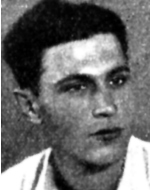Simbol, Yosef (Yoske)
Son of Yehudit and Shlomo, was born on January 30, 1921, in Tel Aviv. After his birth, the family moved to Ein Ganim near Petah Tikva. Yosef attended the PIKA school and the “Ahad Ha’am” high school in Petach Tikvah and later in the Givat Hashlosha regional school, where he helped his parents to do farm work, and when he was 15 he joined the Hanoar Haoved movement and stood out as a guide. He was a member of the “Hapoel Battalions” and served as a sports instructor. “Haganah” and was sent to work in the construction of a barbed-wire fence on the northern border during the 1936-1939 riots, and in 1942 enlisted in the Palmach, Ye mattered more joined the British army, as foreseen the need to fight for the liberation of the homeland. He contributed heroically to the immigration of illegal immigrants and underground activities against the British, two subjects he considered the main national front. During the British siege of Rishpon, he fought with five soldiers guarding the siege around the agriculture and broke into the besieged army. In 1945, he was released from the Palmach, started working for the Electric Company in Petah Tikva and continued to work as a youth counselor, and on his 25th birthday he married his girlfriend Malka When the War of Independence broke out after the United Nations General Assembly decided on 29 November 1947 to divide the country into two states, He took care of the purity of arms and of action against one of the villages, when Arabs entered the home of the mukhtar Yoske, who was a member of the Palmach, Fired fire at him, directed the shots to the height of the roof so as not to harm the women, and then he was assigned a position responsible for the informer Estate department, and as Palmach devotion to duty filled in the gaps in equipment and weapons, he filled it hits and excessive devotion Lacking the office, arrived successfully and was promoted to deputy battalion intelligence officer. Given his family circumstances, his commanders and colleagues tried to keep him away from very dangerous combat missions. And although this service was very important to the war effort, he could not accept the service in the “home front” and was not quiet until he was allowed to participate in the breakthrough to Jerusalem. His friends told him about his coolness and dedication and his speed with the machine gun when he waited for the enemy to reach a safe range (and very dangerous for him), and then achieve maximum “output” with a minimum of bullets. Joseph moved away from command posts, but by his very presence he trusted his friends. From Hulda to the gate of the ravine, he did wonders with his machine gun and seized outposts to secure passage. There, in the narrow valley, when the enemy cut off part of the convoy, he stopped him with his machine gun and allowed the wounded and dead to be gathered and prevented the enemy from pursuing the main part of the convoy, which had managed to cross the small bridge before its explosion, but he himself perished in this battle and fell on the 11th of Nissan, (20.4.1948). He was laid to rest at the military cemetery in Kiryat Anavim. His daughter was born after they fell.
